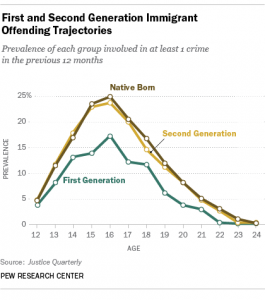Feb 13 2017
Immigration and Crime
 Does legal or illegal immigration increase crime? That is an empirical question that should be answerable through rigorous research. Whatever the answer, it should inform our policy priorities and decisions. At the very least, if we are going to have a national conversation about immigration, the established facts should serve as common ground.
Does legal or illegal immigration increase crime? That is an empirical question that should be answerable through rigorous research. Whatever the answer, it should inform our policy priorities and decisions. At the very least, if we are going to have a national conversation about immigration, the established facts should serve as common ground.
When you are done laughing (or crying) you might be interested to read about recent research into the correlation between patterns of immigration and various types of personal and property crime. Researchers have previously looked at this question by focusing on individuals – are immigrants more or less likely to commit crimes than native born Americans? Let’s consider that question first.
The research overwhelmingly shows that first generation immigrants, whether legal or illegal, are less likely to commit all types of crime at all ages than the native born. Interestingly, by second generation the statistics look more like native born crime rates, so it does not take long to assimilate in this regard. As an aside, this, of course, does not include crossing the boarder illegally itself, but it has been pointed out that being an undocumented immigrant is not a criminal offense, but a civil offence.
Make no mistake, this data can be complicated, and there are studies showing higher incarceration rates for immigrants. Those studies, however, have significant flaws, such as relying on self report, or only looking at particular counties that are likely not representative.
The most complete data shows that immigrants are about one fifth less likely to be incarcerated than the native born. In fact the research delves deeper to determine why that is the case. The difference is not explained through deportation of criminals. Rather, it seems to be mostly due to the self-selective nature of immigration. Those who choose to immigrate, whether legally or illegally, appear to be less likely to commit crimes, or are more responsive to deterrents.
Even if immigrants themselves are less likely to commit crimes, it is still possible, some argue, that immigrants stress government resources and are disruptive in a way that leads to more crime, even if they are not the ones committing the crimes.
This brings us to the current study. The researchers looked at 40 years of FBI statistics on crime and correlated this data with statistics on immigration to various urban areas. They found:
We investigate the immigration-crime relationship among metropolitan areas over a 40 year period from 1970 to 2010. Our goal is to describe the ongoing and changing association between immigration and a broad range of violent and property crimes. Our results indicate that immigration is consistently linked to decreases in violent (e.g., murder) and property (e.g., burglary) crime throughout the time period.
So, not only are immigrants themselves less likely to commit crimes, the cities they move into do not have an increased crime rate, and if anything have a slight trend towards decreased crime rate.
This research replicates other studies that show the same negative correlation between immigration and crime. I could not find any significant scientific debate or disagreement on this basic fact. In fact, I did find an article from 1933 discussing the same question, and finding a negative correlation between immigration and crime. There seems to be a very strong consensus on this conclusion.
What is interesting is the fact that despite this long-standing consensus, there remains an enduring belief among some that immigrants are disproportionately responsible for crime, that they are inherently dangerous and criminal. That seems to be yet another example of the triumph of ideology over facts.
Obviously this issue is coming up again with policy proposals by the Trump administration that are justified by anecdotes of criminals pouring across the border and individual cases of crimes committed by immigrants. Anecdotes, however, do not trump (pun intended) careful research and statistics.
I am not advocating here any particular policy decision. There are also many factors to consider when determining optimal immigration policy.
The facts, however, are the facts, and whatever policy priorities and decisions we do make should at least be informed by the best currently available evidence.






